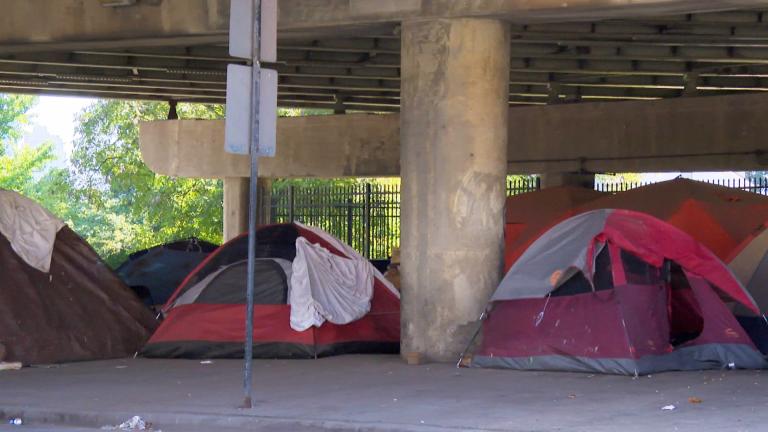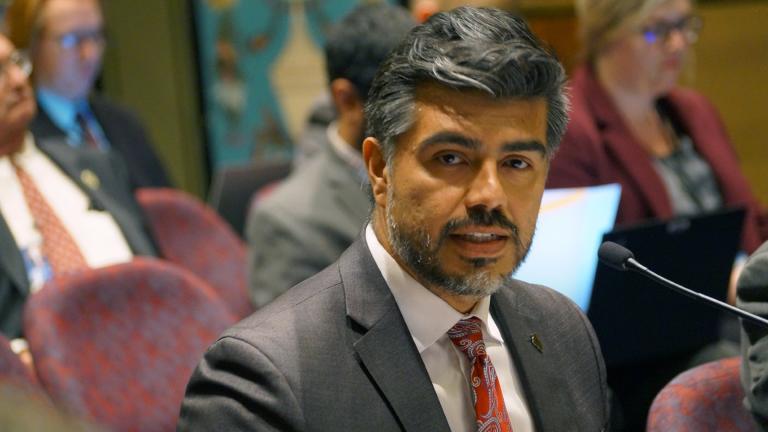Landlords and tenant advocates alike have demands – and concerns – about a new, $1.5 billion program meant to help cover rent that went unpaid during the 14 months since Gov. J.B Pritzker first imposed a ban on evictions in Illinois.
Attorney Lawrence Wood of Legal Aid Chicago said Pritzker’s series of executive orders protected tenants, and public safety, during the COVID-19 pandemic.
“The problem is that while the moratorium has prevented evictions ... it has not relieved tenants of the responsibility to pay the rent that’s been accruing. They still have that debt,” he said.
Pritzker on Monday signaled that he’ll lift the ban in August, and there’s widespread concern that it’ll lead to a sudden burst of evictions.
Michael Mini of the Chicagoland Apartment Association said the new Illinois Rental Payment Program will prevent that wave.
“We really don’t think that there’s going to be what’s been described as a tsunami of evictions once the moratorium ends,” he said. “We think that this can be done in a responsible manner and that we can avoid any mass wave of evictions.”
But Wood said the rental assistance program has limitations.
He doesn’t know if $1.5 billion will be enough to cover all the unpaid rent, nor whether the maximum limit of $25,000 per household will satisfy families’ housing expenses to the point at which they’ll be able to avoid future housing insecurity.
“People haven’t been paying rent since the pandemic started back in March, or many people have not been able to pay rent since that time,” he said. “We don’t know that everybody’s going to get $25,000. We don’t know that they’re going to get the money that they apply for. So it’s hard to tell. This is obviously a very important and very positive step toward addressing this problem, but I don’t know that it’s going to be the cure. But it’s certainly going to help.”
Paul Arena of the Illinois Rental Property Owners Association says the program has serious deficiencies that state and federal officials must address if they’re serious about fixing problems caused by the eviction moratorium, and which will eventually lead to a further shortage of affordable housing as landlords are forced out of the business.
Arena points to a couple: first-time landlords whose tenants stopped paying rent in November 2019 — before the pandemic — but the eviction moratorium kicked in before they could do anything about it. The relief money is only supposed to go to renters with coronavirus-related hardships, so they may not qualify.
Even if they are eligible, the 12-month limit won’t cover the renters’ entire arrears.
Tenants also have to cooperate with landlords to apply for the funding.
“If a tenant just moves out, right, say they stay for a year and then just move out, there’s no assistance for those landlords. They have no option right now,” Arena said. “The assistance is narrow in terms of who it applies to.”
Priority will go to households earning less than 50% of the Area Median Income, adjusted for household size, and only those households with a 2020 income below 80% of the AMI can receive the assistance, meaning some renters – and by extension their landlords – will be left out.
“Government in general has done very little to try to help the housing business like they did other businesses. There (were) forgivable loans given to restaurants and other small businesses. Housing providers got none of that,” he said.
Arena is also upset about a provision in House Bill 2877, signed into law by Pritzker on Monday, that seals eviction records from March 2019 through March 2022.
He said that removes an important screening tool for landlords, meaning they’ll be blindly taking on future tenants who may be dangerous or who don’t pay rent, which he said leaves some landlords unable to pay their own bills.
“They’re destroying the credit of the landlords, right. Those landlords who haven’t been able to pay their bills because they had no income. Their credit is going to be wrecked but nobody is worried about their records. This approach has been so one-sided, it’s frustrating,” Arena said.
North Suburban Legal Aid Clinic’s Director of Housing Law Practice Nareen Kim said sealing eviction records is an important protection so a huge number of tenants won’t be blacklisted from future apartments.
“Even if there’s no eviction order entered, even if they were never physically evicted or a money judgement entered, even the mere filing of a conviction case goes on a tenants’ screening report and a future landlord will see that and not want to rent to them,” Kim said. “We don’t want that huge number of tenants … right now to have problems renting again in the future.”
Kim said she frequently receives calls from tenants seeking help because — through no fault of their own — they haven’t been able to fully afford their housing costs since COVID-19 hit, and that she’s grateful for Illinois’ eviction ban.
She says Pritzker needs to be mindful before fulfilling his pledge to lift the ban come August.
Kim says consideration should be given to the stage of the pandemic at the time.
Government programs are notorious for red tape and prolonged rollouts; August is just a few months away.
“We just want to make sure that all of this money that is out there to provide rental assistance gets distributed fully before the moratorium is lifted. The online application process does take some time before it is approved and the money is distributed,” Kim said. “We’re talking about a great deal of money, there’s a lot of paperwork involved, and there’s checks that need to be done to make sure that the money is going to the right people.”
Meanwhile, Mini’s organization is pressing Pritzker to loosen the restrictions between now and August on when an eviction case can proceed, beyond the exception now for situations in which a judge deems a tenant dangerous.
“To allow for cases to move forward against residents that are breaking the rules, whatever it might be, causing problems, being a danger to other residents of the building,” Mini said.
Evictions should be a last resort, but he said some individuals have taken advantage of government pandemic-era policies.
Follow Amanda Vinicky on Twitter: @AmandaVinicky








